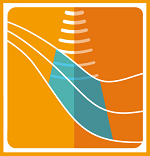|
|
|
Program > SessionsSession OverviewAll sessions last approximately half a day. There are no overlapping sessions. Session 1 - Innovative Methods for Characterizing Spatio-Temporal Changes in the SubsurfaceKeynote: Andrew Binley (Lancaster University) Session description: This session wants to highlight the development and field validation of novel techniques for characterizing spatio-temporal variations in the distribution of flow and water content in the subsurface. These methods will go beyond classical approaches of subsurface characterization, explore the potential of emerging techniques, and validate prototype instruments for monitoring hydrological storages and fluxes. Based on the already existing knowledge, new approaches are used with the aim of applying the latest developed technology in order to make in situ data acquisition productive and reliable.
Session 2 - Inverse modelling for process-based transport imagingKeynote: Haruko Wainwright (Berkeley Lab) Session description: Reliable transport predictions using a physical-based model require to solve the inverse problem satisfactorily. Structure-based imaging tools can assist to acquire a first characterization of the model parameters, and in conjunction with a deterministic model inversion, it allows to assess the influence of parameter on interested variables. But predictions must be used with care, as avoiding non-unique parametrizations as well as non-steadiness of the solutions (ill-posed problem) is cumbersome. This ENIGMA ITN related session contributes here with highlighting the requirement of new innovative process-based imaging techniques and that these are feasible to apply with high resolution (e.g. heat tracer tests). Further, when reference data is getting more complex (i.e. more informative), getting unique parametrization is questioned and data focusing approaches are preferably suitable. The session deals with the potential of multiple tracer injections as well as geophysical tracer observations and advanced Kalman filtering, multiple point statistics, and Monte-Carlo in conjunction with Bayesian Evidential learning. The perspective is that robust transport decisions require an uncertainty quantification considering heterogeneity realistically.
Session 3 - From Research to Application: what we can learn from research at highly instrumented sites when moving to industrial and societal applicationsKeynote: Deltares (dutch company) Session description: Often research is seen as being disconnected from real-life issues, as if researchers and practitioners belonged to different worlds. Joint efforts are needed to break with this mindset, and put into practice in the “industry” what is developed in the “labs”. Throughout the world, highly instrumented sites are built to constitute “field labs” for researchers where they can study nature in its most authentic way. These sites are an example of the contributions that a well-oriented research can have for solving societal issues. The ENIGMA project members aim with this session at bringing closer researchers and practitioners, at nurturing the discussion about field sites and data management, and at pushing forward the efficient implementation of innovative field techniques for their use by state agencies and private companies, important actors in decision-making and policy processes.
Session 4 - Integrated view for hydrological systems: innovation for studying Groundwater - Surfacewater interactionsKeynote: Jörg Lewandowski (Leibniz Institute of Freshwater Ecology and Inland Fisheries) Session description: The interaction between groundwater and surface water bodies is of key importance to understand several hydrological and environmental processes. The combination of classical hydrogeological methods with newly implemented geophysical imaging tools allows for a better representation of the media and, thus, opens a new space for innovation in research. From innovative field techniques to data processing and integrated modelling, the contribution of the ENIGMA ITN broadens the possibility to face the challenges that still exist in the SW-GW interaction world. In this session the discussion will be centered around hyporheic exchange studies, geophysical methods in near streams/lakes systems, submarine groundwater discharge, wetlands, and reach-to-catchment scale integrated modelling. Session 5 - Reactive Tranport: Can we use the knowledge of pore scale processes to enhance field scale modelling?Keynote: Li Li (Penn State University) Session description: Modeling reactive transport requires precise knowledge of the conditions and governing processes acting on the pore scale. However often only data measured on bigger scales is available. Hydrogeophysical methods applied in the context of reactive transport aim to bridge this existing gap. With this session we are looking for contributions showing that the knowledge of small scale effects and processes can be translated to signals measured on bigger scales. We welcome insights to innovative methods, may they be in the first development phase or almost ready for extensive application.
|
| Online user: 8 | Privacy |

|

